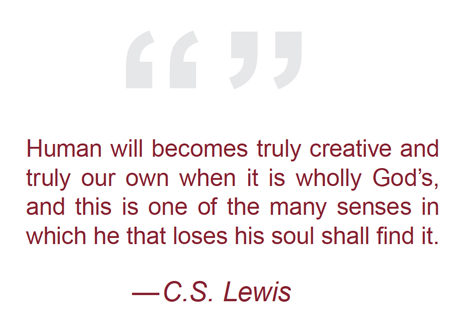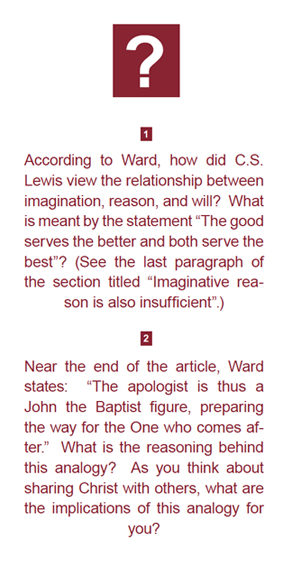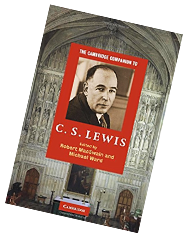Back to series


Recommended Reading:

C.S. Lewis on Imagination and Reason in Christian Apologetics (Part 3 of 3)
(This is a three-part series on C.S. Lewis on Imagination and Reason in Christian Apologetics.
Part 1, Part 2, Part 3 )
Click here to open a Print - Friendly PDF
Imagination Is Insufficient without Reason
Lewis distinguishes between ‘imaginary’ (bad) and ‘imaginative’ (good).1 Pagan myths, howsoever meaningful, were ultimately untrustworthy as a final guide to life because their meanings were imaginary rather than imaginative. Without the controlling and clarifying effects of reason, imaginative efforts at apprehending God are always apt to lose themselves and turn unreliable or even rotten.2 In The Pilgrim’s Regress it is because their imaginative ‘pictures’ are not supplemented by the truthful ‘Rules’ of the Shepherds that the Pagans ‘become corrupt in their imaginations’.3
 Likewise, it is because its resulting play of imagination is undisciplined that awe at the universe’s size can be taken as an argument against God; this is ‘matter spiritualized’ in the wrong sense, the psycho-physical parallelism (wherein meaning resides) mishandled.4 Lewis is almost Feuerbachian here. As Feuerbach considered imagination to be the engine of religion and ground of its falsity, so Lewis would have said that it stoked the engine of religion and was a potential ground of its falsity
Likewise, it is because its resulting play of imagination is undisciplined that awe at the universe’s size can be taken as an argument against God; this is ‘matter spiritualized’ in the wrong sense, the psycho-physical parallelism (wherein meaning resides) mishandled.4 Lewis is almost Feuerbachian here. As Feuerbach considered imagination to be the engine of religion and ground of its falsity, so Lewis would have said that it stoked the engine of religion and was a potential ground of its falsity
To prevent imagination running amok it must be properly related to reason and both to the will. Lewis sometimes pictures the human person as three concentric circles, the outermost being the imagination, the middle ring being the reason, and the core being the will.5 Although imagination is the most exposed of these three rings and the one most naturally inclined to deceive, it is nevertheless indispensable to the two higher or more central levels. Images provide reason and the will with the very stuff of conscious life: ‘I doubt if any act of will or thought or emotion occurs in me without them.’6 Thus, imagination, which is good, serves reason, which is better, and both serve the will, which is best of all. We will look briefly at the will in the final section of this essay, but before we come onto that subject, let us say a little more about how reason works on the meanings supplied to it by imagination.7
 Reason, in Lewis’s scheme, is much more than the faculty of bald ratiocination. The sort of understanding of Reason that Lewis appears to be working with is that ‘Practical Reason’8 which was accepted by ‘nearly all moralists before the eighteenth century’.9 It is difficult to say exactly how much of the detail of that pre-Eighteenth century understanding of Reason Lewis adopted in his own thinking, but there is a general harmony between the idea of the tripartite ‘Rational Soul’ that he outlines descriptively, from the literary historian’s point of view, in The Discarded Image, and the model of man which he presents argumentatively in The Abolition of Man, Mere Christianity, ‘Bluspels and Flalansferes’, ‘On Ethics’, and elsewhere.10
Reason, in Lewis’s scheme, is much more than the faculty of bald ratiocination. The sort of understanding of Reason that Lewis appears to be working with is that ‘Practical Reason’8 which was accepted by ‘nearly all moralists before the eighteenth century’.9 It is difficult to say exactly how much of the detail of that pre-Eighteenth century understanding of Reason Lewis adopted in his own thinking, but there is a general harmony between the idea of the tripartite ‘Rational Soul’ that he outlines descriptively, from the literary historian’s point of view, in The Discarded Image, and the model of man which he presents argumentatively in The Abolition of Man, Mere Christianity, ‘Bluspels and Flalansferes’, ‘On Ethics’, and elsewhere.10
Reason, the defining part of the Rational Soul, consists of intellectus (the ability to see self-evident truth) and ratio (the ability to arrive at truth which is not self-evident). In this two-fold capacity, Reason obviously has a moral element (it is ‘the organ of morality’11) because certain self-evident truths are moral axioms.12 That these understandings of Reason still linger in our concept of morality is shown, Lewis believes, by the fact that, when we would recall a person to right conduct, we sometimes say, ‘Be reasonable’.13 The Rational faculty guides and governs the Sensitive Soul and its five inward ‘wits’ (including the imagination). In doing so, Reason chooses between the meanings presented to it by the imagination, distinguishing true meanings from false and, where a choice of expressions is available, choosing the one most suitable for the desired meanings to be communicated.
One of the reasons, I think, why Lewis has become so long-lived as an apologist, and why some passages from his apologetics have become veritable anthology pieces, is this very point: that his logical, reasoned argumentation is informed by a sensitive poetic intelligence. His choice of image, metaphor, and analogy is controlled by an alert imagination and, as a result, charges what he says with a pleasing appropriateness, even sometimes a superfluity, of meaning. His apologetic writing, at its best, becomes rich and enjoyable for its own sake, almost regardless of whether one actually agrees with the conclusions he arrives at. This carries its own dangers, of course. As Austin Farrer remarked, with respect to The Problem of Pain, ‘We think we are listening to an argument, in fact we are presented with a vision; and it is the vision that carries conviction.’14 But the dangerousness is an indication of the method’s power and, when used aright (for instance, the image of the great ‘dive’ in Miracles as a picture of the Incarnation;15 or the ‘myth’ of Lewis’s own devising in the chapter on agape in The Four Loves),16 the vision does not overpower the argument but supports and indeed enables it.
Imaginative Reason Is Also Insufficient
 Thus the good imagination serves the better reason which allows readers to understand a good deal about their human situation and even a certain amount about God. But only a certain amount. We have already pointed out imagination’s deficiencies; reason also is insufficient for the full knowledge of God. Reason, for Lewis, we must remember, was not the organ of truth but ‘the natural organ of truth’;17 it could not rise to the supernatural in its own strength.18 Though a self-confessed ‘rationalist’,19 Lewis was a great deal more than merely a believer in the power of ‘Enlightenment’ ratiocination. Reason depends not only on what we might call the ground floor (imagination) and but also on the basement (physical sensation20) in order to be supplied with its raw materials.
Thus the good imagination serves the better reason which allows readers to understand a good deal about their human situation and even a certain amount about God. But only a certain amount. We have already pointed out imagination’s deficiencies; reason also is insufficient for the full knowledge of God. Reason, for Lewis, we must remember, was not the organ of truth but ‘the natural organ of truth’;17 it could not rise to the supernatural in its own strength.18 Though a self-confessed ‘rationalist’,19 Lewis was a great deal more than merely a believer in the power of ‘Enlightenment’ ratiocination. Reason depends not only on what we might call the ground floor (imagination) and but also on the basement (physical sensation20) in order to be supplied with its raw materials.
Considered alone, then, reason is nothing special: ‘gnawing, peasant reason’, as the young Lewis calls it.21 It is helpless unless equipped by imagination (and sensation); and even thus equipped it cannot reach into the heavens. To his friend Harwood, Lewis wrote in 1926: ‘No one is more convinced than I that reason is utterly inadequate to the richness and spirituality of real things: indeed this is itself a deliverance of reason.’22 And he never resiled from this position, as many of his later writings, most notably Till We Have Faces, demonstrate.23
So, his religion is not merely rational, any more than it is merely imaginative. But it would be a mistake to conclude that his religion was composed merely of an imaginatively informed rationality: imagination and reason together work not to serve themselves but to serve the will. The good serves the better and both serve the best. The best is the will, the heart of a person, and this requires to be reorientated by a meeting with the divine. However much an apologist may labour with imaginative and rational tools to defend the faith and persuade skeptics to accept its claims, nothing can be achieved “without the intervention of the supernatural”, because only the supernatural can bring about “an alteration of the will”.24 How then, can the apologist hope for supernatural intervention in the imaginatively rational process of Christian apologetics?
Imaginative Reason Serves a Purpose
 There are two ways by which the supernatural may intervene. One method of supernatural revelation is by means of natural revelation. The creative Word of God sustains the ‘natural virtues’25 among which we may include the good use of fallen imagination, no less than the good use of fallen reason, for God is the Father of lights. The divine light enlightens all human minds, not just those which are already Christian, so that certain examples of ‘imaginative perception’ can be argued to be real approaches, however rudimentary, to the ‘idea of God’, approaches that operate ‘beyond our own resources’.26
There are two ways by which the supernatural may intervene. One method of supernatural revelation is by means of natural revelation. The creative Word of God sustains the ‘natural virtues’25 among which we may include the good use of fallen imagination, no less than the good use of fallen reason, for God is the Father of lights. The divine light enlightens all human minds, not just those which are already Christian, so that certain examples of ‘imaginative perception’ can be argued to be real approaches, however rudimentary, to the ‘idea of God’, approaches that operate ‘beyond our own resources’.26
Imagination, like all created things, including reason,27 properly understood, reflects something of its Creator.28 It is this sort of imagination which Lewis told T.S. Eliot he believed in as ‘a truth-bearing faculty’.29 To think otherwise would be to embrace the ‘negative theology’ of the modern ‘German Protestant’ kind, of which Lewis, with his deep-rooted belief in Natural Law, disapproved.30 ‘I am inclined,’ he wrote, ‘to distrust that species of respect for the spiritual order which bases itself on contempt for the natural’.31 The natural exercise of imaginative reason may, up to a point, be a revelation of (and therefore an intervention by) the supernatural.
However, even this is insufficient. The rationally imaginative explanations and defences of Christianity provided by the apologist (and supported by the divine) can only take one so far, and it is at the point where they fall short that the divine intervention already seen in the exercise of natural faculties may be supplemented, God willing, by divine supervention. The internal presence of God in the human subject may meet the external presence of Holy Spirit in direct illumination, or, as may be, mediated through the more normal channels of preaching, sacrament, scripture, prayer, absolution, fasting or other forms of askesis.32
 The apologist is thus a John the Baptist figure, preparing the way for the One who comes after. Apologetics serves a vital ancillary function and this is its main justification, for although reasoned defences do not of themselves create conviction, the absence of them makes belief much harder to engender or sustain. As Farrer wrote, ‘What seems to be proved may not be embraced; but what no one shows the ability to defend is quickly abandoned. Rational argument does not create belief [not even rational argument most richly and sensitively supplied by imagination], but it maintains a climate in which belief may flourish. So the apologist who does nothing but defend may play a useful, though preparatory, part.’33
The apologist is thus a John the Baptist figure, preparing the way for the One who comes after. Apologetics serves a vital ancillary function and this is its main justification, for although reasoned defences do not of themselves create conviction, the absence of them makes belief much harder to engender or sustain. As Farrer wrote, ‘What seems to be proved may not be embraced; but what no one shows the ability to defend is quickly abandoned. Rational argument does not create belief [not even rational argument most richly and sensitively supplied by imagination], but it maintains a climate in which belief may flourish. So the apologist who does nothing but defend may play a useful, though preparatory, part.’33
Divine supervention takes us away from the field of pure apologetics into evangelism and soteriology. The indispensable role Lewis found for divinely-imparted faith both in the acquistion and retention of Christian belief34 is not something we can here address, though it is a subject worth exploring.35 Let us therefore conclude with what Lewis wrote in ‘The Decline of Religion’:
Conversion requires an alteration of the will, and an alteration which, in the last resort, does not occur without the intervention of the supernatural. I do not in the least agree with those who therefore conclude that the spread of an intellectual (and imaginative) climate favourable to Christianity is useless. You do not prove munition workers useless by showing that they cannot themselves win battles, however proper this reminder would be if they attempted to claim the honour due to fighting men. If the intellectual climate is such that, when a man comes to the crisis at which he must either accept or reject Christ, his reason and imagination are not on the wrong side, then his conflict will be fought out under favourable conditions.36
|
Notes: |
|||

Michael Ward
ProfessorMichael Ward is a member of the Faculty of Theology and Religion at the University of Oxford and Professor of Apologetics at Houston Baptist University. He studied English at the University of Oxford, theology at the University of Cambridge, and he earned his PhD in Divinity at the University of St. Andrews. He is the author and editor of multiple books, most notably the award-winning Planet Narnia: The Seven Heavens in the Imagination of C.S. Lewis, After Humanity: A Guide to C.S. Lewis’s The Abolition of Man and The Cambridge Companion to C.S. Lewis. On the fiftieth anniversary of Lewis’s death, Dr. Ward unveiled a permanent national memorial to Lewis in Poets’ Corner, Westminster Abbey, London.

Recommended Reading:
The Cambridge Companion to C. S. Lewis (Cambridge Companions to Religion), edited by Robert MacSwain and Michael Ward (Cambridge University Press, 2010)
A distinguished academic, influential Christian apologist, and best-selling author of children's literature, C. S. Lewis is a controversial and enigmatic figure who continues to fascinate, fifty years after his death. This Companion is the first comprehensive single-volume study written by an international team of scholars to survey Lewis's career as a literary historian, popular theologian, and creative writer. Twenty-one expert voices from Oxford, Cambridge, Princeton, and Wheaton, among many other places of learning, analyze Lewis's work from theological, philosophical, and literary perspectives. Some chapters consider his professional contribution to fields such as critical theory and intellectual history, while others assess his views on issues including moral knowledge, gender, prayer, war, love, suffering, and Scripture. The final chapters investigate his work as a writer of fiction and poetry. Original in its approach and unique in its scope, this Companion shows that C. S. Lewis was much more than merely the man behind Narnia.
 COPYRIGHT: This publication is published by C.S. Lewis Institute; 8001 Braddock Road, Suite 301; Springfield, VA 22151. Portions of the publication may be reproduced for noncommercial, local church or ministry use without prior permission. Electronic copies of the PDF files may be duplicated and transmitted via e-mail for personal and church use. Articles may not be modified without prior written permission of the Institute. For questions, contact the Institute: 703.914.5602 or email us.
COPYRIGHT: This publication is published by C.S. Lewis Institute; 8001 Braddock Road, Suite 301; Springfield, VA 22151. Portions of the publication may be reproduced for noncommercial, local church or ministry use without prior permission. Electronic copies of the PDF files may be duplicated and transmitted via e-mail for personal and church use. Articles may not be modified without prior written permission of the Institute. For questions, contact the Institute: 703.914.5602 or email us.
-
Recent Podcasts
Ralph Waldo Emerson’s Philosophy and Influence
by David George Moore on July 26, 2024Ralph Waldo Emerson was a gifted nineteenth century...Read More
-
The Side B Stories – Nate Sala’s Story
by Jana Harmon, Nate Sala on July 19, 2024
-
Terrorism Through the Eyes of Faith
by Dennis Hollinger on July 12, 2024
-
Recent Publications
Hasn’t Science Proven That Belief in God Is an Outdated Superstition?
by Sharon Dirckx on July 1, 2024Many assume that scientific practice and belief in...Read More
-
Has the Bible Been Corrupted as Some Muslims Claim?
by Andy Bannister on June 1, 2024
-
Seeing Jesus Through the Eyes of Women
by Rebecca McLaughlin on May 15, 2024
0
All Booked
0.00
All Booked
0.00
All Booked
22194
C.S. Lewis’s The Abolition of Man Live Online Small Group 8:00 PM ET
https://www.cslewisinstitute.org/?event=c-s-lewiss-the-abolition-of-man-study-course&event_date=2024-10-02®=1
https://www.paypal.com/cgi-bin/webscr
2024-10-02

Next coming event
Days
Hours
Minutes
Seconds
C.S. Lewis’s The Abolition of Man Live Online Small Group 8:00 PM ET
On October 2, 2024 at 8:00 pmCategories
Speakers

Michael Ward
Professor
Team Members

Michael Ward
ProfessorMichael Ward is a member of the Faculty of Theology and Religion at the University of Oxford and Professor of Apologetics at Houston Baptist University. He studied English at the University of Oxford, theology at the University of Cambridge, and he earned his PhD in Divinity at the University of St. Andrews. He is the author and editor of multiple books, most notably the award-winning Planet Narnia: The Seven Heavens in the Imagination of C.S. Lewis, After Humanity: A Guide to C.S. Lewis’s The Abolition of Man and The Cambridge Companion to C.S. Lewis. On the fiftieth anniversary of Lewis’s death, Dr. Ward unveiled a permanent national memorial to Lewis in Poets’ Corner, Westminster Abbey, London.






